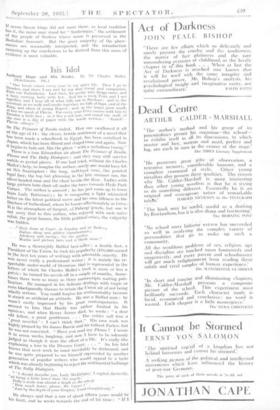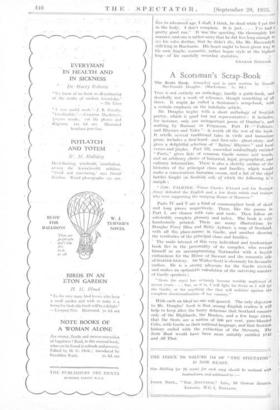Isis Id©l
Anthony Hope and His Books. By Si'' Charles Mallet. (Hutchinson. I 8s.) Hope and His Books. By Si'' Charles Mallet. (Hutchinson. I 8s.)
"
One break comes ovary year in my qufiretelrilidica. ridTliceoilinIpagnoiotno, Dresden, and there I am met by my clear i Gritz von Tarlenheim.. Last time, his pretty wife Helga came, and a lusty crowing baby with her. And for a week Fritz and l aro together, and I hear all of what fails outwien aSiiitc..eolsfa4t,aanItitdionf the (zonings, wo walk and smoke together, as, the hours grow small, 1‘.8, and often of young Rupert ; Fritz carries with him to
attest vvo speak of FIavia. For every year
'Dresden ill•it lies a red rose, and round the stalk of the, rose a little box ; rose is a slip of paper with the words written ' Rudolf - r' atvia---always '." So The Prisoner of Zenda ended. how one swallowed it all. at the age of 14 : the clever, brittle. So"nent of a novel that tlas been made a schoolbook in ,Egypt, has been serialised in Japan, which has been filmed and staged time and again. Now it begins to fade out, like the. ghost " with melodious twang." There is a true Edwardian air about The Prisoner of Zenda, Phroso and The Dolly Dialogues ; and they may still survive uw./Ille as period pieces. If one had tried, without Sir Charles Mallet's help, to imagine the author, surely 9nq would have bit: 171 this frontispiece : the long, well-bred nose, .the pointed legal face, the top hat gleaming in the ° late summer sun,, the silver-headed cane and the chair beside the Jiow. Ladies with, large picture hats slant off-under the tree* I,,nwards Hyde Park. The author is amused ; he has just come up to town. ..1.9n1 Lady Battersea's ; he is composing a light whimsical: letter on the latest political move and his own idleness to the Duchess of Sutherland, whom he knows afrectienatelY. as Criss.; It is the atmosphere of Sargent, of FalIcTfie jewels,, but one is uOt sorry that to this author, who, enjoyed with such naïve 'Visit the great houses, the little political crises, the vulgarity, was hidden. .
Rich Jews at Court, in London. and at Baden ;
Italian slang and golden chamberware ;
Adultery and, racing ; for the garden
MUslin and picture hats and iv blank stare.
He was a thoroughly Balliol best-seller.: a double first, a President of the Union, he took his popularity (270,000 earned in the first ten years of writing) with admirable suavity. He Was, never really a professional writer it is mainly the re- „PePtable under-world of literature that is represented in the letters of which Sir Charles Mallet's hook is more or less a P..Tectis he turned his novels off in a couple of months. Some- times there were as many as three manuscripts waiting pub- lication. He managed in his delicate dealings with tragic, or even blackguardly themes to retain the Union air of not being Wholly serious. You could forgive his sentimentality beeause it struck so artificial, an attitude. He was a Balliol man : he Wasn't easilyimpressed by his great contemporaries. It oeenied to him that Hardy was rather limited in his °oFiniTnl, and when Henry James died, he wrote ” a dear dl The critics call him a fellow, a great gentleman. . • • great novelist ' : I can't think that." His own work was highly praised lint' Sir James Barrie and Sir Gilbert Parker, but
.
.1▪ 1.0 was not conceited. " Have you read my Phroso ? I wrote it in seven weeks, laughing, and 110W. I have to be solemnly judged as though it were the effort of a life. it's really like explaining a kiss in the Divorce Court. • • • " An Isis Idol knows that next week lie must inevitably be dethroned, and he Was quite prepared to see himself suPerse4.ed by another generation of popular writers who would appeal to a taste which was already beginning to reject the sentimental badinage of The Dolly Dialoubues
•
ili ..“ ,reetly,
I should describe you, Lady Mieldeliarn,' : replied
▪ being 'a:little' lower than the angels.'. ''`'°11Y's smile was almost- a laugh as she
How much lower, please, Mr. Garter'?
Just by the depth of your dimples,' I said thoughtlessly."
his always said that. a' run of about fifteen years would be his lirnit, and he wrote towards the end of his time : " if I 'liVe td advanced age, Shall, I think, be dead while I yet live in the body. I don't complain. It is just. . . . I've had A ,pretty good "itin." It 'Was 'the sporting; the 'thornughly- Tsis . manner, and one is rather sorry that he did live long enough to sec his sales decline, that he didn't die, like Mr. Rassendylli still king in Ruritania. His heart ought to have given way in his own_ fragile, romantic, '.rather hogus style -at the highest
leap—of his carefully recorded statistics: • t" GRAHAM GREENER







































 Previous page
Previous page